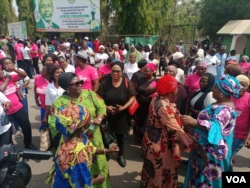Abuja, Nigeria – Women’s rights groups protested in Nigeria’s capital Wednesday to demand greater representation of women in the country’s parliaments. Lawmakers on Tuesday approved a bill that would set aside 20 percent of seats for women, but protesters say one-fifth is not enough.
Some 200 women barricaded the entrance of the Nigerian National Assembly, holding up posters and banners and singing songs. The protesters, including market women, civil servants and various professionals, prevented lawmakers from entering their offices Wednesday.
Protesters say they were not satisfied with Tuesday’s vote to increase women’s share of parliament seats at both the state and national levels to 20 percent – nearly triple the current rate of seven percent. They want 35 percent of seats to be allocated to women.
‘We need new ideas, new minds and diverse views, which is why we are pushing for women,’ said Cynthia Mbamalu, an organizer of Wednesday’s protest. ‘If we have women in government, there will be an assessment of policies and laws from both male and female lens and we are looking at issues that affect women, children and young people from a diverse perspective. We cannot expect development or things to change if decisions are made by the same kind of people.’

Hansatu Adegbite, who heads the Women in Business Initiative, also took part in the protest.
‘Women have to arise, enough is enough,’ she said. ‘I am appealing to every single woman in any sector, arise and let us take over this nation. It is about all of us and we are here to take over this nation once and for all.’
Nigeria’s lawmakers began an exercise this week to review the country’s national constitution of 1999.
Women’s representation in Nigeria’s parliament, at around 4%, is among the lowest in the world. Activists say patriarchy and cultural biases are some factors influencing women’s low participation in government.
Lawmakers responded to the protesters after hours of demonstrations.
Deputy chief whip Sabi Abdullahi promised the protesters that their demands will be reviewed.
‘The conversation we’re having now is a good step and I want us to look at it as work in progress and as we talk, we understand the issues, I’m sure we can get somewhere,’ Abdullahi said.
Africa has seen an increase in the number of women in parliament, but a European research group, the International Institute for Democracy and Electoral Assistance, says African countries are unlikely to reach the U.N. goal of gender parity in politics by 2030.
Nigerian protesters said African countries like Senegal, Rwanda, South Africa, Tanzania and Botswana are getting more women involved in key economic and political positions.






